Released alongside the Seagate Exos M 30TB, the Seagate IronWolf Pro 30TB is the company’s newest flagship NAS-focused hard drive, designed specifically for commercial and enterprise multi-bay environments. It’s engineered to deliver 7 x 24 access, high workload endurance, and class-leading reliability for collaborative, networked storage systems.
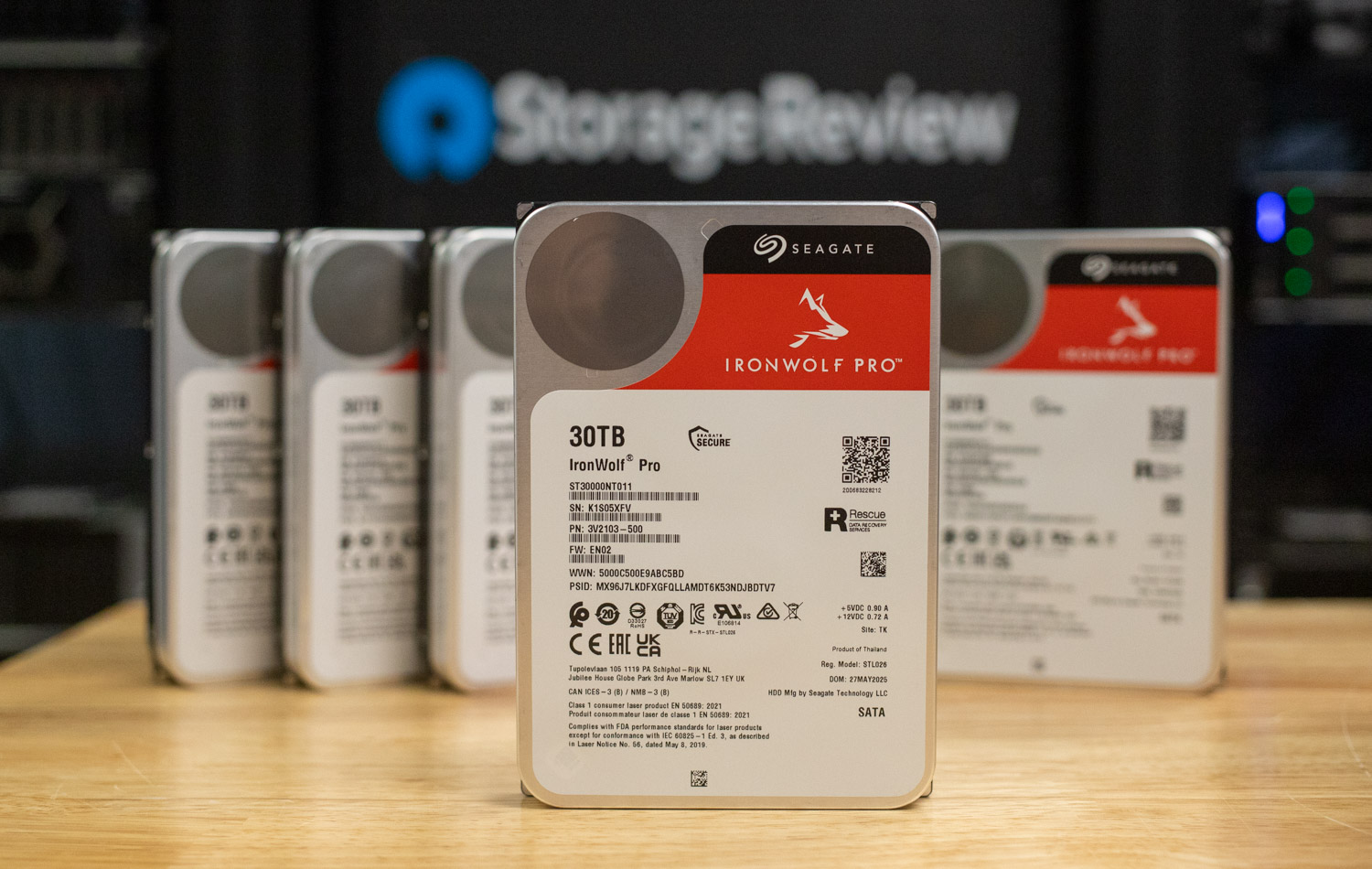
Features
The IronWolf Pro 30TB is purpose-built for NAS and shared storage deployments, offering the highest capacity in Seagate’s NAS lineup. It utilizes Conventional Magnetic Recording (CMR) to ensure consistent performance in demanding multi-user environments. It is optimized for always-on operation, making it ideal for environments that require uninterrupted access.
Much like the Seagate Exos M 30TB drives we received, we can see the same “Class 1 Laser Product” warning label on the IronWolf Pro 30TB, indicating that this drive also utilizes Seagate’s HAMR (Heat-Assisted Magnetic Recording) technology. While the IronWolf Pro series is known for CMR, this labeling confirms that HAMR is quietly enabling the areal density behind the drive’s 30TB capacity. HAMR utilizes a precision laser to briefly heat the media surface, allowing the data to be written to tighter, more precise regions than traditional methods permit. This technology is part of Seagate’s broader Mozaic 3+ platform and plays a critical role in scaling capacities beyond current CMR limitations. We explored this shift in detail during Podcast #124, featuring Seagate’s Colin Presly, where we discussed how HAMR is redefining the limits of high-capacity storage.
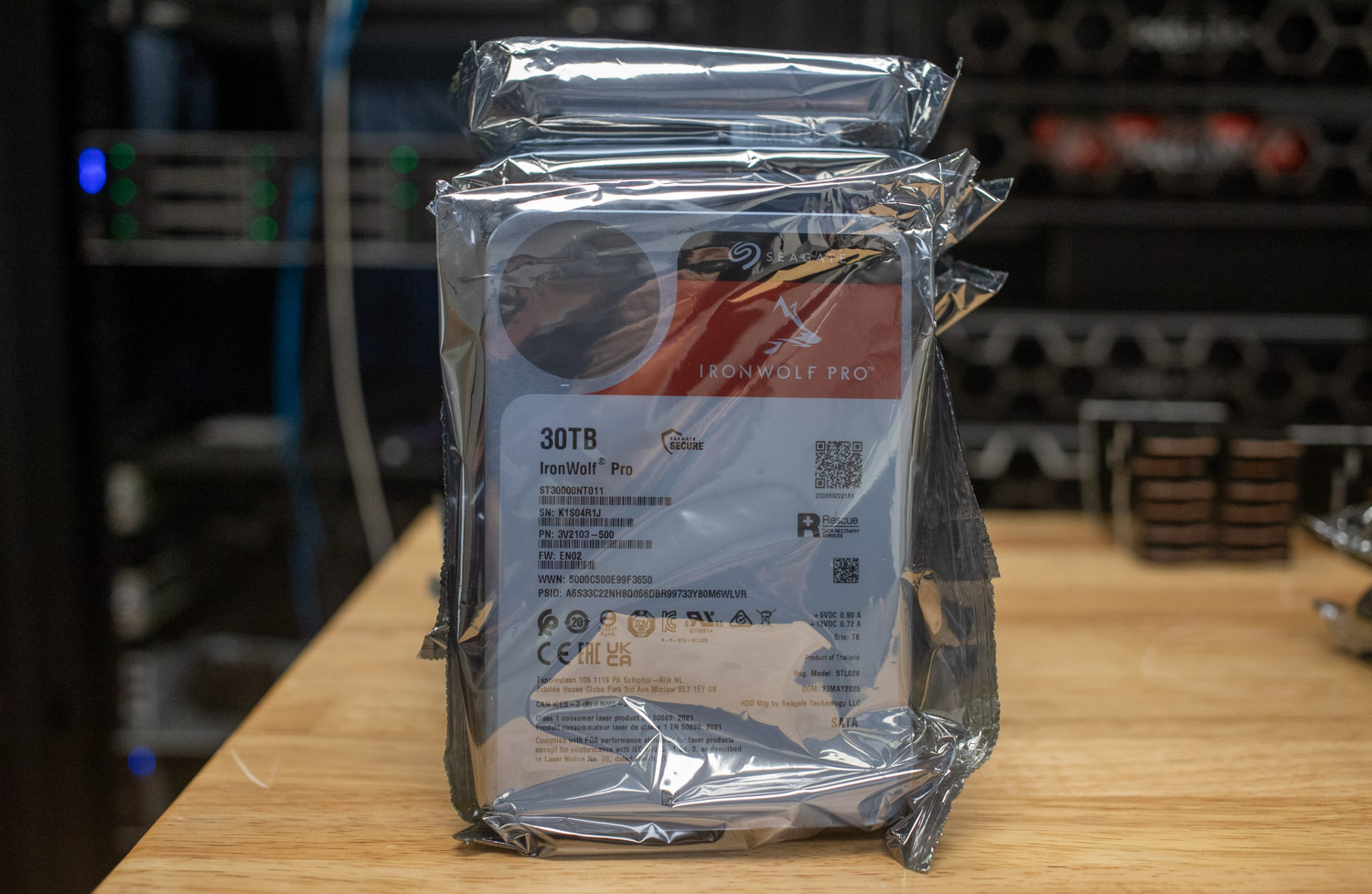
It features AgileArray NAS-optimized firmware, which enables dual-plane balancing, Time-Limited Error Recovery (TLER), and integrated rotational vibration (RV) sensors to ensure stable performance in multi-bay enclosures. These enhancements are key to maintaining throughput and minimizing rebuild times in RAID-configured systems.
Seagate IronWolf Pro 30TB Reliability
Designed for long-term deployment, the IronWolf Pro 30TB is rated for 2.5 million hours of MTBF and is backed by a five-year limited warranty, placing it at the top of Seagate’s NAS-class offerings in terms of reliability and endurance. Its 550TB/year workload rating provides ample headroom for heavy NAS usage, including frequent writes, high concurrency, and multi-user access.
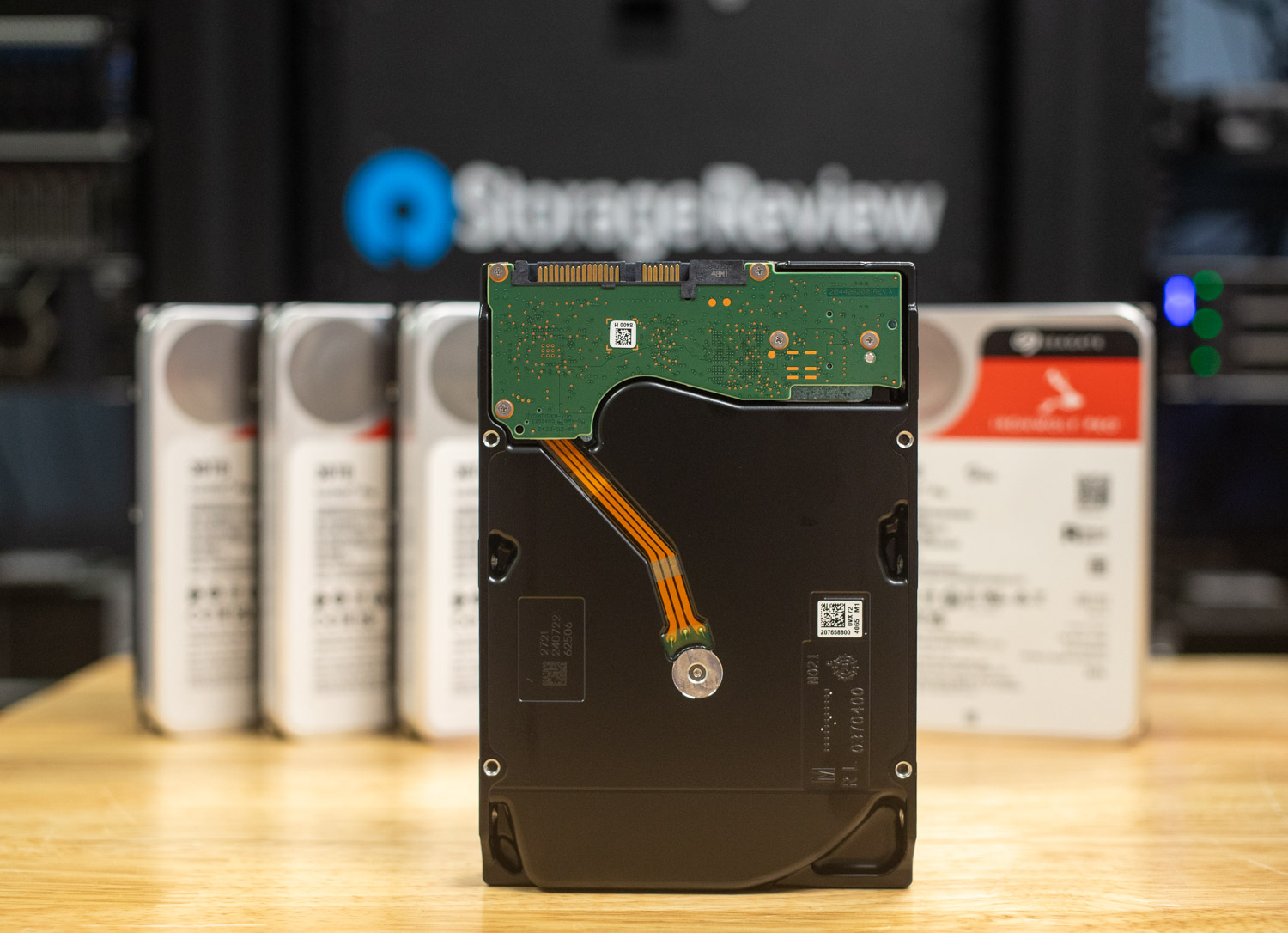
The drive also leverages IronWolf Health Management (IHM) for active monitoring and failure prevention on supported NAS systems. In the event of physical damage or corruption, it’s covered by three years of Rescue Data Recovery Services, with Seagate boasting a 95% success rate.
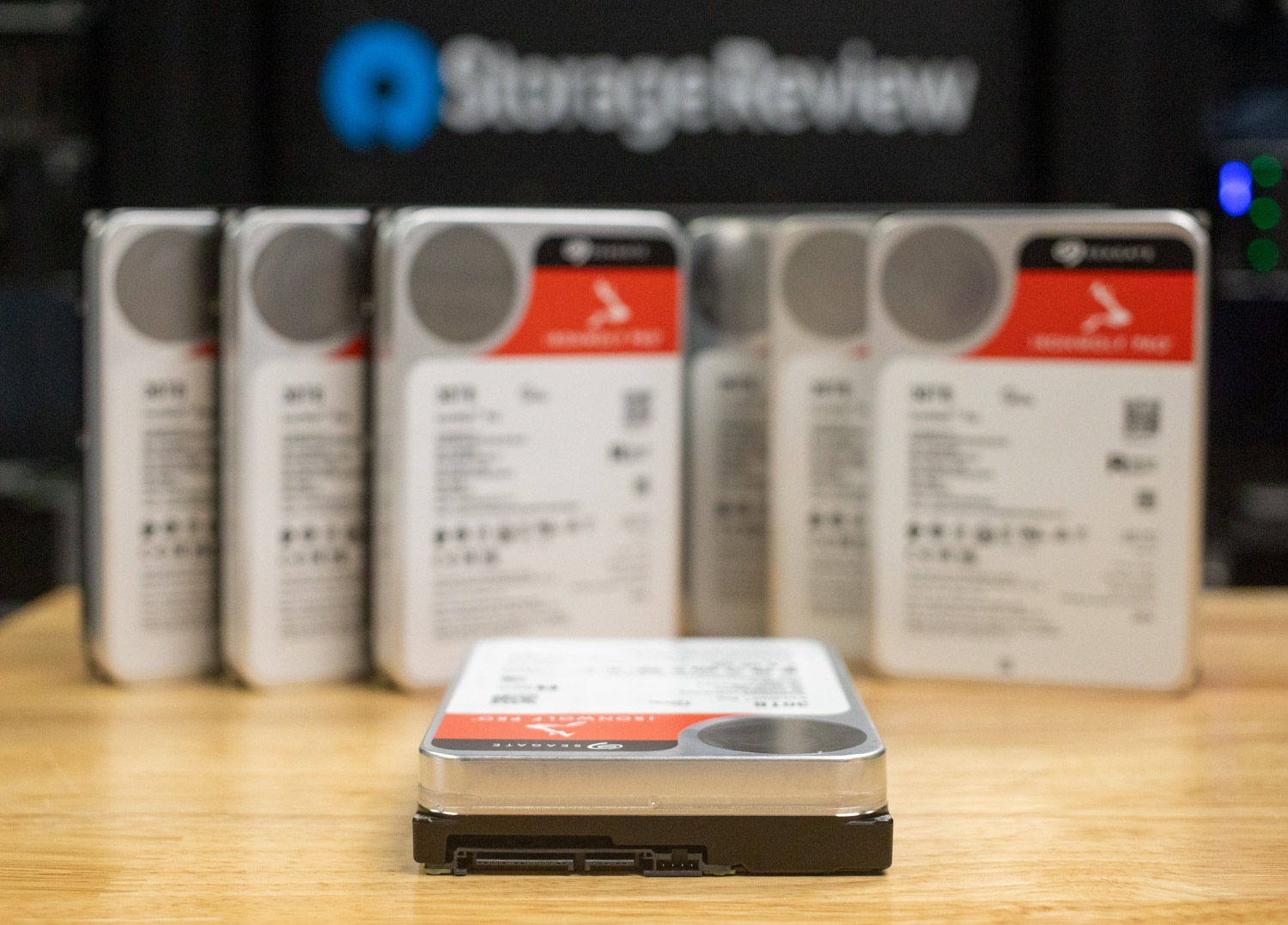
To validate its real-world performance, Seagate sent us a few of the IronWolf Pro 30TB drives to test in the lab alongside the Exos M 30TB and ran them through our full suite of mixed HDD benchmarks.
Specifications
This table highlights the key specifications of the Seagate IronWolf Pro 30TB, including its performance ratings, reliability metrics, power requirements, and features tailored for NAS environments.
| Specification | Details |
| Standard Model Number | ST30000NT011 |
| Interface | SATA 6Gb/s |
| Drive Bays Supported | Unlimited |
| Recording Technology | CMR |
| Drive Design (Air or Helium) | Helium |
| Workload Rate Limit (WRL) | 550 |
| Rotational Vibration (RV) Sensors | Yes |
| Cache (MB) | 512 |
| Mean Time Between Failures (MTBF, hours) | 2,500,000 |
| Nonrecoverable Read Errors per Bits Read | 1 per 10E15 |
| Power-On Hours (per year) | 8760 |
| Sector Size (Bytes per Logical Sector) | 512E |
| Rescue Data Recovery Services (years) | 3 |
| Limited Warranty (years) | 5 |
| Spindle Speed (RPM) | 7200RPM |
| Interface Access Speed (Gb/s) | 6.0, 3.0, 1.5 |
| Max. Sustained Transfer Rate OD (MB/s) | 275 |
| Rotational Vibration @ 10-1500 Hz (rad/s) | 12.5 |
| Startup Current, Typical (12V, A) | 2.0A |
| Idle Power, Average (W) | 6.8W |
| Average Operating Power (W) | 8.3W |
| Standby Mode, Typical (W) | 1.2W |
| Sleep Mode, Typical (W) | 1.2W |
| Power Supply Requirements | +12 V and +5 V |
| Operating Temperature (ambient, min °C) | 10°C |
| Operating Temperature (drive reported, max °C) | 60°C |
| Nonoperating Temperature (ambient, min °C) | -40°C |
| Nonoperating Temperature (ambient, max °C) | 70°C |
| Vibration, Nonoperating: 10Hz to 500Hz (Grms) | 2.27 |
| Acoustics, Idle (typical, measured in Idle 1 state) (dBA) | 28 |
| Acoustics, Seek (typical) (dBA) | 32 |
| Shock, Operating 2ms (Read/Write) (Gs) | 30/30Gs |
| Shock, Nonoperating, 1ms and 2ms (Gs) | 200 |
| Dimensions (mm/in) |
|
| Weight (g/lb, typical) | 695g / 1.53lb |
Seagate IronWolf Pro 30TB Performance
Before diving into the benchmarks, here’s a list of comparable capacity HDDs used to compare the performance of the Seagate IronWolf Pro 30TB drive.
Here’s the high-performance test rig we used for storage benchmarking:
- CPU: AMD Ryzen 7 9800X3D
- Motherboard: Asus ROG Crosshair X870E Hero
- RAM: G.SKILL Trident Z5 Royal Series DDR5-6000 (2x16GB)
- GPU: NVIDIA GeForce RTX 4090
- OS: Windows 11 Pro, Ubuntu 24.10 Desktop
Peak Synthetic Performance
The FIO test is a flexible and powerful benchmarking tool used to measure the performance of storage devices, including SSDs and HDDs. It evaluates metrics such as bandwidth, IOPS (Input/Output Operations Per Second), and latency under different workloads, like sequential and random read/write operations. This test helps to assess the peak performance of storage systems, making it useful for comparing different devices or configurations. We measured the peak burst performance for this test, limiting the workload to a 10GB footprint on all tested HDDs.
In FIO testing, the Seagate IronWolf Pro 30TB delivered solid upper-tier performance across sequential and random workloads. It achieved 287MB/s in sequential 128K reads and 267MB/s in sequential writes, trailing the Exos M 30TB and WD Gold 24TB in write speed but remaining competitive overall. In 4K random reads, it matched the Exos M at 205 IOPS with nearly identical latency, showing consistent responsiveness. For 4K random writes, it posted 301 IOPS, which, while lower than the x24 24TB and WD Gold, still provided stable latency and aligned with its NAS-optimized design.
| FIO Test (higher MB/s/IOPS is better) | Sequential 128K Read (1T/64Q) | Sequential 128K Write (1T/64Q) | Random 4K Read (16T/32Q) | Random 4K Write (16T/32Q) |
| Seagate Exos 30TB | 292MB/s (28.72ms) | 289MB/s (29.04ms) | 205 IOPS (155.58ms) | 341 IOPS (93.79ms) |
| Seagate IronWolf Pro 30TB | 287MB/s (29.23ms) | 267MB/s (31.39ms) | 205 IOPS (155.74ms) | 301 IOPS (105.95ms) |
| Seagate x24 24TB | 285MB/s (29.42ms) | 285MB/s (29.42ms) | 210 IOPS (152.03ms) | 749 IOPS (42.70ms) |
| WD Gold 24TB | 283MB/s (29.66ms) | 286MB/s (29.36ms) | 214 IOPS (148.98ms) | 651 IOPS (49.11ms) |
| WD Red Pro 22TB | 271MB/s (31.00ms) | 276MB/s (30.37ms) | 214 IOPS (149.17ms) | 421 IOPS (75.92ms) |
| WD Ultrastar DC HC590 | 268MB/s (31.28ms) | 280MB/s (30.00ms) | 198 IOPS (161.18ms) | 663 IOPS (48.23ms) |
Average LLM Load Time
The Average LLM Load Time test evaluated the load times of three different LLMs: DeepSeek R1 7B, Meta Llama 3.2 11B, and DeepSeek R1 32B. Each model was tested 10 times, and the average load time was calculated. This test measures the drive’s ability to load large language models (LLMs) into memory quickly. LLM load times are crucial for AI-related tasks, particularly for real-time inference and processing large datasets. Faster loading enables the model to process data rapidly, thereby improving AI responsiveness and reducing waiting time.
In the Average LLM Load Time test, the IronWolf 30TB performed mid-pack across all three models tested. It loaded DeepSeek R1 7B in 48.42 seconds and Meta Llama 3.2 11B in 69.91 seconds, both slightly slower than the Exos M and WD Gold but ahead of drives like the x24 24TB and WD Red Pro. For the larger DeepSeek R1 32B model, it completed the load in 72.38 seconds, trailing the WD Gold and HC590 but staying close to the Exos M.
| Average LLM Load Time (lower is better) | DeepSeek R1 7B | Meta Llama 3.2 11B Vision | DeepSeek R1 32B |
| Seagate Exos 30TB | 46.4424s | 68.7064s | 72.7249s |
| WD Gold 24TB | 46.7133s | 68.8183s | 68.9720s |
| WD Ultrastar DC HC590 26TB | 47.9877s | 71.0063s | 69.7892s |
| Seagate IronWolf Pro 30TB | 48.4175s | 69.9071s | 72.3803s |
| Seagate x24 24TB | 48.6615s | 71.4855s | 73.8097s |
| WD Red Pro 22TB | 49.0575s | 71.4783s | 71.1382s |
3DMark Storage
The 3DMark Storage Benchmark tests your SSD’s gaming performance by measuring tasks like loading games, saving progress, installing game files, and recording gameplay. It evaluates how well your storage handles real-world gaming activities and supports the latest storage technologies for accurate performance insights.
In the 3DMark Storage Benchmark, the IronWolf 30TB scored 231, placing third overall and performing nearly on par with the top two drives. The x24 24TB scored 234, and the Exos M 30TB followed closely at 223, with all three Seagate models landing within just a few points of each other. This result highlights the IronWolf Pro’s consistent performance, aligning closely with its Seagate counterparts across real-world workload simulations.
| 3DMark Storage Benchmark (higher is better) | Overall Score |
| Seagate x24 24TB | 234 |
| Seagate Exos 30TB | 223 |
| Seagate IronWolf Pro 30TB | 231 |
| WD Ultrastar DC HC590 26TB | 168 |
| WD Red Pro 22TB | 156 |
| WD Gold 24TB | 150 |
BlackMagic Disk Speed Test
The BlackMagic Disk Speed Test benchmarks a drive’s read and write speeds, estimating its performance, especially for video editing tasks. It helps users ensure their storage is fast enough for high-resolution content, like 4K or 8K video.
In the BlackMagic Disk Speed Test, the IronWolf 30TB delivered strong results with 267.6 MB/s read and 272.7 MB/s write speeds. While it trailed slightly behind the Exos M 30TB in read performance, it maintained the second-highest write speed among all drives tested.
| BlackMagic Disk Speed (MB/s, higher is better) | Read MB/s | Write MB/s |
| Seagate Exos 30TB | 274.6 | 275.2 |
| WD Gold 24TB | 272.8 | 213.0 |
| Seagate x24 24TB | 271.0 | 164.4 |
| Seagate IronWolf Pro 30TB | 267.6 | 272.7 |
| WD Ultrastar DC HC590 26TB | 267.0 | 264.5 |
| WD Red Pro 22TB | 260.9 | 258.3 |
PCMark 10 Storage
PCMark 10 Storage Benchmarks evaluate real-world storage performance using application-based traces. They test the system and data drives, measuring bandwidth, access times, and consistency under load. These benchmarks offer practical insights beyond synthetic tests, enabling users to compare modern storage solutions effectively.
In the PCMark 10 Data Drive Benchmark, the IronWolf 30TB scored 771, placing second overall just ahead of the Exos M 30TB at 769. It trailed only the WD Ultrastar DC HC590, which led with 853. The IronWolf Pro outperformed the x24 24TB, WD Gold, and WD Red Pro by a significant margin, demonstrating strong real-world application performance and consistent responsiveness under load.
| PCMark 10 Data Drive (higher is better) | Overall Score |
| WD Ultrastar DC HC590 26TB | 853 |
| Seagate IronWolf Pro 30TB | 771 |
| Seagate Exos 30TB | 769 |
| Seagate x24 24TB | 671 |
| WD Gold 24TB | 397 |
| WD Red Pro 22TB | 380 |
Conclusion
Seagate IronWolf Pro 30TB delivered strong, well-rounded performance tailored for commercial and enterprise NAS environments. Released alongside the Exos M 30TB, it consistently held its ground in testing, showing comparable throughput, reliability, and real-world responsiveness across the board. In sequential workloads, the IronWolf Pro trailed the Exos M slightly but maintained solid consistency in random operations, particularly in read latency and responsiveness.
In application-focused benchmarks like PCMark 10 and 3DMark Storage, the IronWolf Pro performed closely with the Exos M and x24 24TB, with all three drives finishing within a narrow margin. Its high write speeds in the BlackMagic Disk Speed Test and respectable LLM load times further demonstrate its versatility across mixed workloads.
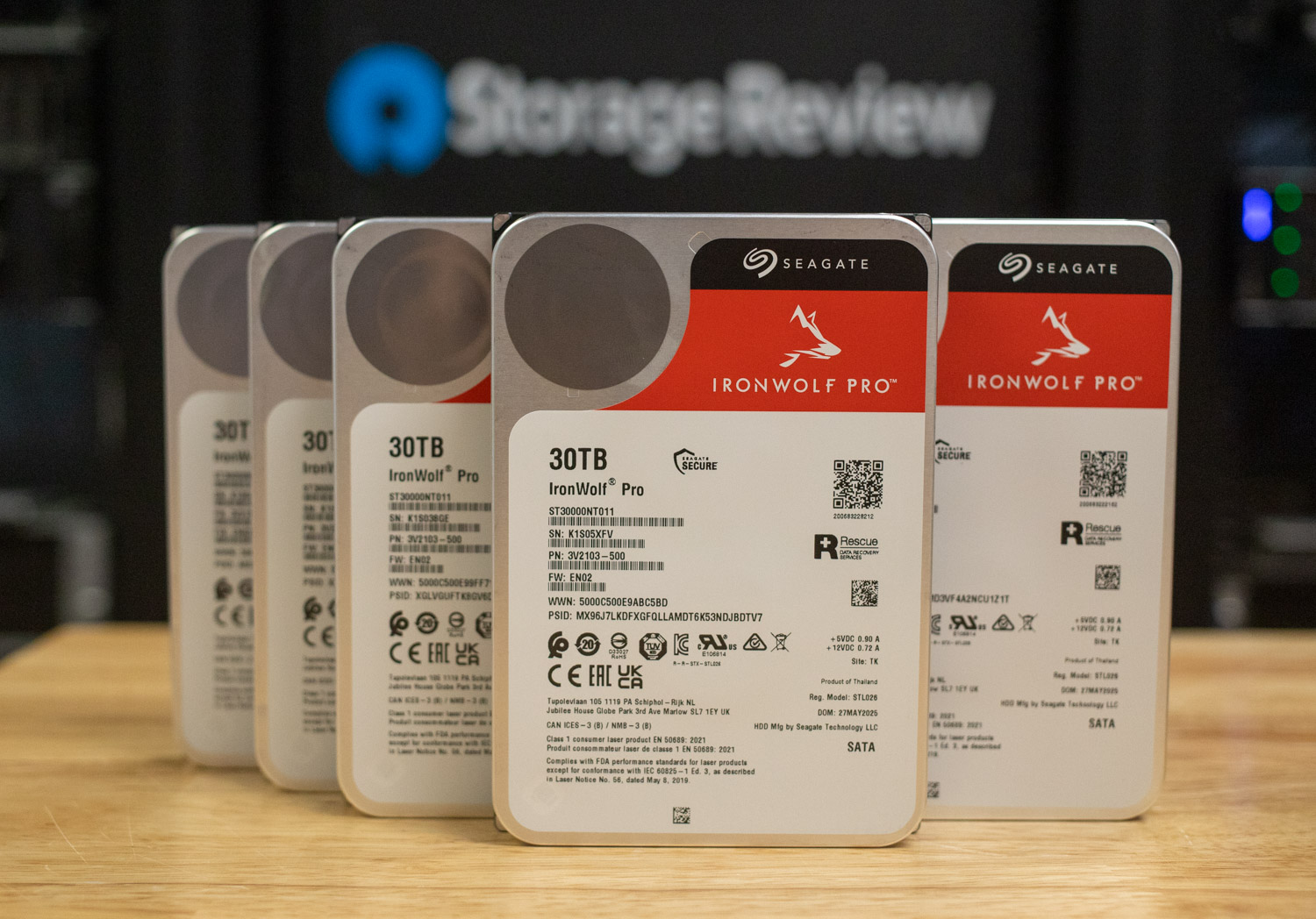
Designed for continuous operation, the IronWolf Pro supports a 550TB per year workload rating and a 2.5 million-hour MTBF. It includes NAS-focused features like AgileArray firmware and vibration resistance, along with IronWolf Health Management for proactive monitoring. Users also benefit from three years of included Rescue Data Recovery Services, adding another layer of assurance for enterprises or businesses.
For users building out multi-bay NAS systems, collaborative storage environments, or high-capacity RAID arrays, the IronWolf Pro 30TB offers a dependable blend of capacity, performance, and endurance, matching the value and scalability expected from Seagate’s enterprise NAS lineup.




 Amazon
Amazon